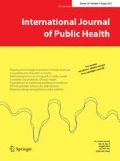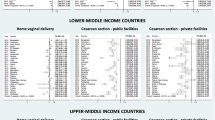Summary
Objectives:
Twenty-six percent of all women giving birth in Switzerland are of non-Swiss nationality. Differences in reproductive health outcomes such as preterm deliveries, Caesarean sections, and breastfeeding initiation for mother-child pairs of various nationalities are investigated, and the influence of the educational level was assessed. In order to identify trans-national differences, national breastfeeding rates from 22 countries and Caesarean section rates from 24 countries were compared to the rates in Swiss hospitals.
Study Sample:
Drawing on routinely collected monitoring data, 37 332 mother-child pairs from various nationalities, who delivered in Swiss Baby-Friendly hospitals between 2000 and 2002, were included in the study. All nationalities with at least 150 deliveries were coded individually, while the remaining were summarised in regional groups.
Results:
Sub-Saharan African, Latin American and Asian mothers had higher rates of Caesarean sections compared to Swiss mothers (OR = 1.77, 95 % CI 1.49–2.22; OR = 1.80, 1.51–2.17; OR = 1.37, 1.18.1.59). African and Asian children were at an increased risk of being transferred to neonatal care units (OR = 1.48, 95 % CI 1.19–1.83; OR = 1.45, 1.21–1.73;). In addition, infants from Balkan countries, who showed lowest Caesarean section rates, were also more likely to be transferred to an ICU (OR = 1.30, 95 % CI 1.12–1.52). Apart from the country or region of origin, the maternal educational level was an important influence and modified the effect of the mother’s nationality.
Mothers from all regions, apart from Western Europe, were significantly more likely to breastfeed their children after being discharged. Established determinants for breastfeeding duration, including feeding exclusively with breast milk in maternity wards, early initiation of breastfeeding, rooming-in and pacifier use, varied according to nationality.
The comparison of Caesarean section and breastfeeding rates with the rates in the mother’s country of origin additionally investigates the relation between reproductive health outcomes of migrant women in Switzerland compared to their country of origin. In both cases, a significant rank correlation (Spearman) could be established between the rate in Swiss hospitals and the rate in the mother’s country of origin (P < 0.001, P = 0.04).
Conclusions:
Our data confirms inequalities in reproductive health outcomes and responses to health promotion programmes among migrant women in Switzerland. These differences are dependent on educational level and on the mothers’ nationality. The large variation suggests that different trans-national experiences play some role in health-related decision-making and access to health care. This should be considered when planning health promotion programs and the individual counselling of pregnant mothers in Switzerland.
Similar content being viewed by others
Author information
Authors and Affiliations
Corresponding author
Additional information
Submitted: 7 March 2006; Revised: 28 October 2006; Accepted: 19 February 2007
Rights and permissions
About this article
Cite this article
Merten, S., Wyss, C. & Ackermann-Liebrich, U. Caesarean sections and breastfeeding initiation among migrants in Switzerland. Int J Public Health 52, 210–222 (2007). https://doi.org/10.1007/s00038-007-6035-8
Published:
Issue Date:
DOI: https://doi.org/10.1007/s00038-007-6035-8



